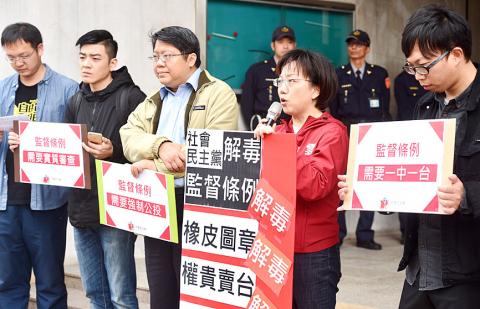Activists yesterday welcomed proposals to transfer the review of supervisory articles governing negotiations with China to a joint legislative committee, calling for amendments and hastening the review process.
“This is an important bill which does not just address internal administrative questions,” said Economic Democracy Union convener Lai Chung-chiang (賴中強), who was part of the Sunflower movement, at a rally outside the Legislative Yuan in Taipei with Social Democratic Party (SDP) activists. “Allowing legislators from all related committees to be included in discussions and to propose substantial amendments is the right direction.”
Passage of supervisory articles was a key demand of the Sunflower movement, which saw student activists occupy the legislature in 2014 to protest an agreement negotiated by the then-Chinese Nationalist Party (KMT) government.

Photo: Peter Lo, Taipei Times
Legislators yesterday clashed over whether review of the supervisory articles should be conducted by the Internal Administration Committee or a special joint legislative committee, allowing lawmakers from the New Power Party (NPP) — which is not represented on the Internal Administration Committee — to vote and directly propose amendments during the review process.
NPP Executive Chairman Huang Kuo-chang (黃國昌) was a prominent Sunflower movement activist, and the party has promised to propose Economic Democracy Union-sponsored amendments to the draft bill.
Lai added that a joint committee review should not be an excuse to delay a committee review.
“What we do not want is for an agreement for a joint committee review, only to see the bill drop out of sight, like a stone sinking to the bottom of the sea,” he said, reiterating activists’ concerns that cross-strait talks are likely to resume next year following the Chinese Communist Party’s 19th National Party Congress this fall.
Lai also called for the Democratic Progressive Party (DPP) to explain how the proposed supervisory articles would affect previously negotiated agreements on trade in services and goods.
Whether the government would be required to submit negotiation plans for a trade in goods agreement after the bill’s passage remains unclear, he said.
It is also unclear whether there will be an article-by-article or package vote on the service trade agreement, he said.
SDP Chairperson Fan Yun (范雲) called for changes to the DPP caucus’ draft bill that would require a substantive review of agreements, automatic referendums on the results of political talks, to redefine “cross-strait relations” as being between “Taiwan and China,” as well as applying any new review requirements to the proposed service trade agreement.
She said that the DPP seemed to have a “goldfish brain” — lacking long-term memory — over the service trade agreement, which served as the catalyst for the Sunflower movement.
“Given that the official draft does not include provisions that would ensure it is retroactively applied to the service trade agreement, how does [the DPP] intend to address the issue? So far it has failed to give us a clear answer,” she said.

Tropical Storm Gaemi strengthened into a typhoon at 2pm yesterday, and could make landfall in Yilan County tomorrow, the Central Weather Administration (CWA) said yesterday. The agency was scheduled to issue a sea warning at 11:30pm yesterday, and could issue a land warning later today. Gaemi was moving north-northwest at 4kph, carrying maximum sustained winds near its center of up to 118.8kph and gusts of 154.8kph. The circumference is forecast to reach eastern Taiwan tomorrow morning, with the center making landfall in Yilan County later that night before departing from the north coast, CWA weather forecaster Kuan Shin-ping (官欣平) said yesterday. Uncertainty remains and

SEA WARNING LIKELY: The storm, named Gaemi, could become a moderate typhoon on Wednesday or Thursday, with the Taipei City Government preparing for flooding A tropical depression east of the Philippines developed into a tropical storm named Gaemi at 2pm yesterday, and was moving toward eastern Taiwan, the Central Weather Administration (CWA) said. Gaemi could begin to affect Taiwan proper on Tuesday, lasting until Friday, and could develop into a moderate typhoon on Wednesday or Thursday, it said. A sea warning for Gaemi could be issued as early as Tuesday morning, it added. Gaemi, the third tropical storm in the Pacific Ocean this typhoon season, is projected to begin moving northwest today, and be closest to Taiwan on Wednesday or Thursday, the agency said. Today, there would likely

DISRUPTIONS: The high-speed rail is to operate as normal, while several airlines either canceled flights or announced early departures or late arrivals Schools and offices in 15 cities and counties are to be closed today due to Typhoon Gaemi, local governments announced last night. The 15 are: Taipei, New Taipei City, Taoyuan, Tainan, Keelung, Hsinchu and Kaohsiung, as well as Yilan, Hualien, Hsinchu, Miaoli, Chiayi, Pingtung, Penghu and Lienchiang counties. People should brace for torrential rainfall brought by the storm, with its center forecast to make landfall on the east coast between tonight and tomorrow morning, the Central Weather Administration (CWA) said. The agency issued a sea warning for the typhoon at 11:30pm on Monday, followed by a land warning at 11:30am yesterday. As of

CASUALTY: A 70-year-old woman was killed by a falling tree in Kaohsiung as the premier warned all government agencies to remain on high alert for the next 24 hours Schools and offices nationwide are to be closed for a second day today as Typhoon Gaemi crosses over the nation, bringing torrential rain and whipping winds. Gaemi was forecast to make landfall late last night. From Tuesday night, its outer band brought substantial rainfall and strong winds to the nation. As of 6:15pm last night, the typhoon’s center was 20km southeast of Hualien County, Central Weather Administration (CWA) data showed. It was moving at 19kph and had a radius of 250km. As of 3pm yesterday, one woman had died, while 58 people were injured, the Central Emergency Operation Center said. The 70-year-old